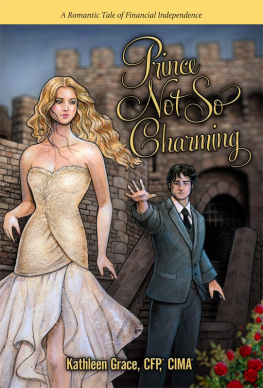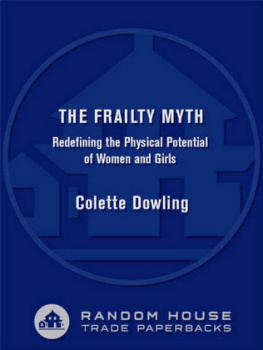This book made available by the Internet Archive.
CONTENTS vi
CHAPTER 5 BECOMING "COOL": HOW WE LEARN TO BETRAY OURSELVES 92
Feeling the Lack Forced Passage Where Was My Vision of
a Future? Beginning to Doubt, Beginning to Debt Entering
the Feminine Underground Shutting Down and Shutting Up:
Preparation for Romance "Prunella": A Girl's Alter Ego
Protects Her Without a Bridge
CHAPTER 6 THE ROMANCE MYTH: HOW FEMALES
GET SIDETRACKED FROM THE GOAL
OF SELF-SUPPORT 124
Capitulating to Daddy Losing Heart Put-Down in
the Classroom Sluts R Us: The Trauma of Sexual
Maturity The Fallacy of Romantic Protection Stella
Takes Care of Herself, at Least for Now Caught in
the Romance Myth: Evelyn's Story Creating the
Hero Then Counting on Him The End of the
Romance Mistress of Your Own Fate
CHAPTER 7 WAKING FROM THE DREAM OF RESCUE 169
Hero Worship What's Love Got to Do With It? The Dream
of Rescue One Last Fling with the Hero Rescue in
Reverse Self-Debting: A Woman Who Cares for Others at the
Expense of Her Own Security Projections Deconstructing
the Prince Becoming a Player
CHAPTER 8 ATTITUDES OF THE AMBIVALENT 214
Terminal Vagueness Internalized Incompetence
Why Women Fear the Power of Money Watching Our
Mothers Rage and Revenge: "I'll Make You
Give It to Me"
CONTENTS vii
CHAPTER 9 BUILDING YOUR OWN CASTLE:
GETTING OYER THE FEAR
OF FINANCIAL INDEPENDENCE 236
Fear of Investing Getting Started Investment Clubs:
Women Teaching Themselves Beyond Therapy Losing
Everything Surrender Learning to Cope: Debtors
Anonymous Working the Program Resistance
No More Dressing the Part Healing
NOTES 281
BIBLIOGRAPHY 289
AUTHOR'S NOTE
I decided to begin this book with my own money story, painful as it is, because it shows so vividly how accomplishment and financial success aren't necessarily proof that one is comfortable with having to support oneself.
If you had suggested to me ten years ago, even five, that I would methodically (if unconsciously) set about destroying my financial security, losing all the money I'd made on a bestselling book, losing, even, my furniture, I would have laughed. I would have told you I was over my biggest hurdles, that I knew who I was and had the financial comfort and psychological equanimity to prove it. I'd raised my kids, after all. I'd learned a profession, taught myself a difficult craft, done marriage, done the single life. I'd even faced the difficult task of putting my parents to rest.
But there was something else, it turned out. I remained deeply conflicted about financial independence. Making money as a single mother was fine. Someone had to support the children, after all. Someone had to put them through school. But once they were
AUTHOR'S NOTE x
on their own, and I was responsible for no one but me, my psychological reality silently shifted. What did it mean that I didn't need anyone for support? And was I really prepared to go on supporting myself for decades to come?
Such questions lay at the heart of my book Th e Cinderella Complex. But when it was published, in the early eighties, I didn't understand that my resistance to taking care of myself financially was only burrowing deeper as I "mastered" life and built an increasingly brittle facade of independence. Concerns about success, money, and my desirability as a woman continued to fester. Eventually, the anxiety drove me to destroy everything I'd built up. It turned out I was more comfortable without money of my own piling up in an investment account. Why would this be? And was I so different from other women? I didn't think so.
Our history with money has not been the same as men's, obviously. What has been less obvious is how our entire sense of ourselves as female has been tied to not having money, not managing it, not being financially independent. As I interviewed women around the country for Maxing Out, I came to see how confused we remain on the subject of what constitutes femininity, of how much independence one can achieve and still feel like a "real" woman. I would find that women are afraid to make the ultimate commitment to themselves for fear of ending up alone, unloved and uncared for.
I decided to write this book to find out why that fear, in spite of what we know intellectually, remains so emotionally gripping. True femininity, true security, depends on our getting past the fear of supporting ourselves and being able, instead, to commit to it, enjoy it, feel powerful and desirable because we can take care of ourselves. Without getting to the bottom of this conflict, I was sure, women would continue in a state of financial precariousness and insecurity, struggling indefinitely with the discomfiting sense of being out of control.
MAXING OUT
Chapter 1 A WOMAN'S CRISIS
"Poor Little Rich Girl," screamed the headline of the New York Post. There was a photograph of a thin woman in jewelry and jeans striding purposefully down a New York street. "Gloria Vanderbilt, heiress to one of America's most famous fortunes, has moved into a small 2-bedroom apartment after having to sell two luxury homes in order to pay her taxes," the caption read.
It's the sort of front page I've always ignored, but not this time. This time I was riveted. I had just finished selling two homes to pay off part of a debt to the IRS and was still reeling from the shock. Other people had such problems, but not me. Now I was having to acknowledge a whole hidden part of myself. I wa s a fif ty-five-year-ol d woma n who, when it came to money, had been behaving like a teenager with her first credit card.
Three years earlier I had owned two country propert ies, a^o^op in Manhattan, and a retir ement fund worth a quarter of a million dollars . Now I had neither the retirement fund nor the houses nor any credit worth a damn.
MAXING OUT
I am no heiress, but I certainly felt identified with Gloria Vanderbilt. Even after selling everything I'd worked so hard for and handing over the profits to the government, I still owed the IRS twenty-six thousand dollars.
For years I was able to ignore the fact that I was avoiding dealing with money. I had so little of it as a struggling writer and as the wife of a struggling writer that no one could see how I was mismanaging things, least of all me. I thought I was courageous because I wouldn't let the lack of money beat me down. Like so many women, I had learned to scrimp and save. I could make the best linguine with clam sauce for the quarters and dimes it took to buy a half pound of spaghetti, a can of clams, and a bunch of parsley. I could clothe myself in dresses made from Vogue patterns and remnants bought on Fourteenth Street. A certain principle was operating here: doing well at doing without is the same thing as doing.















